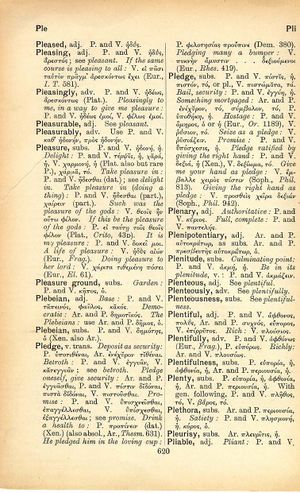pleasure: Difference between revisions
From LSJ
ἀκίνδυνοι δ' ἀρεταὶ οὔτε παρ' ἀνδράσιν οὔτ' ἐν ναυσὶ κοίλαις τίμιαι → but excellence without danger is honored neither among men nor in hollow ships
m (Text replacement - "<b class="b2">Frag.</b>" to "''Frag.''") |
m (Text replacement - "<b class="b2">Crito, 4</b>" to "''Crito'', 4") |
||
| Line 6: | Line 6: | ||
<b class="b2">Take pleasure in</b> (<b class="b2">doing a thing</b>): P. and V. ἥδεσθαι (part.), [[χαίρω|χαίρειν]] (part.). | <b class="b2">Take pleasure in</b> (<b class="b2">doing a thing</b>): P. and V. ἥδεσθαι (part.), [[χαίρω|χαίρειν]] (part.). | ||
<b class="b2">Such was the pleasure of the gods</b>: V. θεοῖς ἦν οὕτω φίλον. | <b class="b2">Such was the pleasure of the gods</b>: V. θεοῖς ἦν οὕτω φίλον. | ||
<b class="b2">If this be the pleasure of the gods</b>: P. εἰ ταύτῃ τοῖς θεοῖς φίλον (Plat., | <b class="b2">If this be the pleasure of the gods</b>: P. εἰ ταύτῃ τοῖς θεοῖς φίλον (Plat., ''Crito'', 43D). | ||
<b class="b2">It is my pleasure</b>: P. and V. δοκεῖ μοι. | <b class="b2">It is my pleasure</b>: P. and V. δοκεῖ μοι. | ||
<b class="b2">A life of pleasure</b>: V. ἡδὺς [[αἰών]] (Eur., ''Frag.''). | <b class="b2">A life of pleasure</b>: V. ἡδὺς [[αἰών]] (Eur., ''Frag.''). | ||
<b class="b2">Doing pleasure to her lord</b>: V. χάριτα τιθεμένη πόσει (Eur., ''El.'' 61). | <b class="b2">Doing pleasure to her lord</b>: V. χάριτα τιθεμένη πόσει (Eur., ''El.'' 61). | ||
}} | }} | ||
Revision as of 18:28, 9 August 2017
English > Greek (Woodhouse)
subs.
P. and V. ἡδονή, ἡ. Delight: P. and V. τέρψις, ἡ, χαρά, ἡ, V. χαρμονή, ἡ (Plat. also but rare P.), χάρμα, τό. Take pleasure in: P. and V. ἥδεσθαι (dat.); see delight in. Take pleasure in (doing a thing): P. and V. ἥδεσθαι (part.), χαίρειν (part.). Such was the pleasure of the gods: V. θεοῖς ἦν οὕτω φίλον. If this be the pleasure of the gods: P. εἰ ταύτῃ τοῖς θεοῖς φίλον (Plat., Crito, 43D). It is my pleasure: P. and V. δοκεῖ μοι. A life of pleasure: V. ἡδὺς αἰών (Eur., Frag.). Doing pleasure to her lord: V. χάριτα τιθεμένη πόσει (Eur., El. 61).

